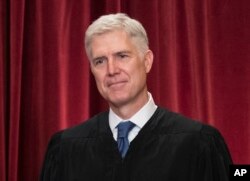The U.S. Supreme Court on Monday opened a new term that could alter America's landscape on immigration, travel restrictions, workers’ rights, gay rights, data privacy, and congressional redistricting.
“There is only one prediction that is entirely safe about the upcoming term, and that is it will be momentous,” Justice Ruth Bader Ginsburg commented at a public forum last month.
Operating at full strength since Justice Neil Gorsuch’s confirmation in April, the high court heard arguments in the first two cases of what promises to be a blockbuster docket stretching into November. Monday’s arguments centered on the ability of employees to band together in disputes against their employers, and on laws governing the removal of non-citizens who commit crimes in the United States.
Travel ban case in limbo
One highly-anticipated case is in limbo. The Supreme Court cancelled next week’s scheduled arguments on President Donald Trump’s travel ban from mostly-Muslim nations after the administration issued a new executive order that adds North Korea, Venezuela and Chad to the list of countries subject to a visa ban, while dropping Sudan. Earlier this year, the high court allowed the previous travel ban to go forward but required exemptions for those with close familial ties to the United States.
Legal scholars say the Supreme Court could decide that to rule on the now-expired travel ban is pointless, and allow challenges to the current executive order to make their way through the lower courts.
Rights of LGBT customers
Many other cases will go forward in coming weeks. Two years after legalizing same-sex marriage nationwide, the Supreme Court will consider the rights of LGBT customers in the marketplace and whether a business may refuse service, citing religious beliefs.
The case centers on a Colorado baker who declined to make a wedding cake for a gay couple. Colorado courts found the baker in violation of the state's anti-discrimination laws.
In briefs to the Supreme Court, the baker’s attorneys argued that their client “is an artist” who creates “elaborate custom cakes” and that America's guarantee of freedom of expression gives him the right “to use his artistic talents to promote only messages that align with his religious beliefs.”
Attorneys for the gay couple asserted that no message on the cake was ever requested. Colorado’s Civil Rights Commission wrote that the baker had refused to sell the couple “a wedding cake of any design based solely on the fact that they are a same-sex couple.”
On Tuesday, the Supreme Court will hear arguments in a case that could impact how legislative districts are drawn and the degree to which their delineation may favor one political party over another, a practice known as gerrymandering. Last year, a federal court found Wisconsin's state assembly map unconstitutional, having been drawn to assure that “the number of Republican seats would not drop below 50 percent.”
Conservative majority
The Supreme Court has ruled that districts may not be drawn to disadvantage racial or ethnic minority communities. A ruling that sets boundaries on partisan gerrymandering could have a major impact on state legislatures nationwide as well as the U.S. Congress, for which districts will be reapportioned and redrawn after the 2020 national census.
Another case is of interest to any American with a cellular phone. The high court will decide whether authorities need a warrant to obtain cell tower data pinpointing users' locations. The case centers on two men who were arrested for a string of robberies after investigators obtained the defendants' phone data showing their devices in use where the crimes had been committed.
Gorsuch's confirmation reestablished a 5-4 conservative majority in the Supreme Court. For most of 2016, the court operated with eight justices after the death of Antonin Scalia.






